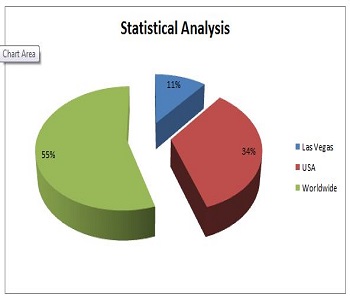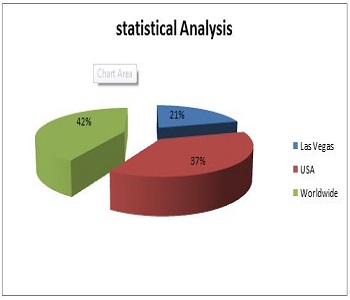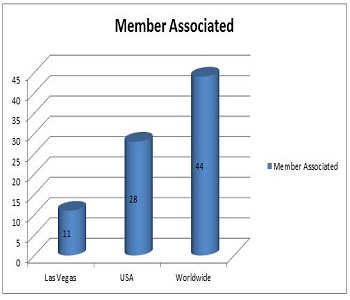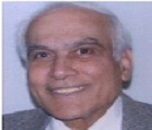Sessions/Tracks
ConferenceSeries Ltd is a renowned organization that organizes highly notable pediatrics conferences throughout the globe. After a successful conference of Pediatric Oncology 2016, ConferenceSeries Ltd is currently bringing forth "2nd International Conference on Pediatric Oncology and Pediatric Medicine" (Pediatric Oncology 2017) slated on October 05-06, 2017 at Las Vegas, Nevada, USA.
Pediatric Oncology 2017 is a global platform to discuss and learn about Pediatric Oncology, Pediatric Medicine, Pediatric Hematology Oncology, Types of Pediatric Oncology, Pediatric Leukemia, Pediatric Radiology, Pediatric Neuro-Oncology, Pediatric Oncology Diagnosis, Pediatric Oncology Treatment, Pediatric Oncology Nursing, Pediatric Cancer Care, Pediatric Emergeny Medicine, Pediatric Critical Care and Health Care Medicine, Pediatric Pharmacology, Neonatology Care Medicine, Clinical Trials.
Track 1: Pediatric Oncology
Pediatric oncology is a strength discipline in drug concerned with diagnosing and treating kids, as a rule up to the age of 18, with malignancy. It is thought to be one of the most challenging of specialties because, despite successful treatment of many children, there is a high death rate still connected with different sorts of malignancies. Sorts of Pediatric Oncology incorporate Pediatric Hematology Oncology, Pediatric Leukemia, Neuroblastoma in Children, Brain Tumor in Children, Clinical Trials, Advances in Pediatric Oncology Treatment, Oncology Nursing and Care, Advanced Pediatric Oncology Drugs, Pediatric Radiation Oncology, Pediatric Oncology Diagnostic, Radiotherapy Oncology, Pediatric Neuro-Oncology.
Related Conferences: Pediatrics Conferences March 23-25, 2017, Orlando, USA; Pediatric Oncology Conferences August 28-30, 2017 Philadelphia, USA; Pediatrics Conferences September 01-03, 2017 Prague, Czech Republic; Neonatology Conferences November 14-16, 2016 Valencia, Spain; Neonatal Conferences November 14-16, 2016 Valencia, Spain; Pediatric Neurology Conference November 14-16, 2016 Valencia, Spain; European School of Radiology GALEN Advanced Course: Pediatric Imaging September 17-18 2015, Turkey; European Academy of Pediatrics, congress and Mastercourse 2015 September 17-20 2015, Norway; Clinical Medicine - Clinical Pediatrics, Family and Emergency Medicine Conference September 18-20, Canada; 4th International Conference on Immunotherapy in Pediatric Oncology September 25-26 2015, United States; 43rd Annual Meeting of the International Society for Pediatric Neurosurgery October 04-08 2015, Turkey
Related Conferences: Pediatrics Conferences March 23-25, 2017, Orlando, USA; Pediatric Oncology Conferences August 28-30, 2017 Philadelphia, USA; Pediatrics Conferences September 01-03, 2017 Prague, Czech Republic; Neonatology Conferences November 14-16, 2016 Valencia, Spain; Neonatal Conferences November 14-16, 2016 Valencia, Spain; Pediatric Neurology Conference November 14-16, 2016 Valencia, Spain; ESMO Sarcoma & GIST Conference 2016 February 16-17 2016, Italy; 2016 Gastrointestinal Cancers Symposium (AGA, ASCO, ASTRO & SSO) January 21-23 2016, California; 16th Annual Targeted Therapies of Lung Cancer Meeting (IASLC) February 17-20 2016, California; 7th European Multidisciplinary Meeting on Urological Cancers (EMUC) November 12-15 2015, Spain; 14th International Kidney Cancer Symposium November 6 -7 2015, Florida
Track 2: Pediatric Haematology Oncology
Pediatric hematology is the branch of pediatrics dealing with study, diagnosis, treatment and prevention different types of blood disorders including the study of bleeding and clotting disorders in children. The study of Tumor Cell Biology reviews applications concerned with signal transduction mechanisms in neoplastic cells, and regulation of tumor cell phenotype and behavior, and tumor progression. It important to study causes, risk factors and the hypothesis in pediatrics with hematology disorders. A medical practitioner who specializes in this field of pediatric hematology is called pediatric hematologist. It is important that one should be familiar with the educational and preventive measures in order to prevent children being affected with blood disorders.
Related Conferences: Pediatrics Conferences March 23-25, 2017, Orlando, USA; Pediatric Oncology Conferences August 28-30, 2017 Philadelphia, USA; Pediatrics Conferences September 01-03, 2017 Prague, Czech Republic; Neonatology Conferences November 14-16, 2016 Valencia, Spain; Neonatal Conferences November 14-16, 2016 Valencia, Spain; Pediatric Neurology Conference November 14-16, 2016 Valencia, Spain; ASH Meeting on Hematologic Malignancies September 17-19 2015, United States; 4th International Conference on Immunotherapy in Pediatric Oncology September 25-26 2015, United States; Canadian Hematology Conference October 02-03 2015 Toronto, Canada; Hämato/Onko Refresher November 06-07 Nov 2015, Germany
Track 3: Types of Pediatric Oncology
The most common cancer in children is Leukemia, which are cancers of the bone marrow and blood, are the most common childhood cancers. They account for about 30% of all cancers in children. Brain and central nervous system tumors are the second most common cancers in children, making up about 26% of childhood cancers. Neuroblastoma starts in early forms of nerve cells found in a developing embryo or fetus. About 6% of childhood cancers are neuroblastomas. Wilms tumor starts in one, or rarely, both kidneys. It is most often found in children about 3 to 4 years old. It can show up as a swelling or lump in the belly (abdomen). It accounts for about 5% of childhood cancers. Lymphoma start in certain cells of the immune system called lymphocytes. They most often grow in lymph nodes and other lymph tissues, like the tonsils or thymus. Rhabdomyosarcoma starts in cells that normally develop into skeletal muscles. It makes up about 3% of childhood cancers. Osteosarcoma is most common in teens, and usually develops in areas where the bone is growing quickly, such as near the ends of the long bones in the legs or arms. Ewing sarcoma is a less common type of bone cancer, which can also cause bone pain and swelling. It is most often found in young teens. Germ cell tumors make up about 3% of all childhood cancers. Ninety percent of germ cell tumors are gonadal which are found in the ovaries or testicles and are more common in children and adolescents. Pleuropulmonary blastoma (PPB) is a rare childhood cancer occurring in the chest, specifically in the lungs or in the coverings of the lungs called "pleura". Hepatoblastoma is the most common primary liver tumor in children, accounting for just over 1% of pediatric cancers.
Related Conferences: Pediatrics Conferences March 23-25, 2017, Orlando, USA; Pediatric Oncology Conferences August 28-30, 2017 Philadelphia, USA; Pediatrics Conferences September 01-03, 2017 Prague, Czech Republic; Neonatology Conferences November 14-16, 2016 Valencia, Spain; Neonatal Conferences November 14-16, 2016 Valencia, Spain; Pediatric Neurology Conference November 14-16, 2016 Valencia, Spain; 4th AACR International Conference on Frontiers in Basic Cancer Research October 23 - 26 2015, Philadelphia; 7th European Multidisciplinary Meeting on Urological Cancers (EMUC) November 12 - 15 2015, Spain; European Academy of Paediatrics, congress and Mastercourse 2015 September 17-20 2015, Norway; Clinical Medicine- Clinical Pediatrics, Family and Emergency Medicine Conference September 18 -20 2015, Canada; 22nd European Symposium on Urogenital Radiology September 16-20 2015, Denmark
Track 4: Pediatric Leukemia
Leukemia is usually described either as "acute", which grows quickly, or "chronic", which grows slowly. One main type of acute leukemia is acute lymphocytic leukemia (ALL), which accounts for about 3 out of 4 cases of leukemia in children. ALL is a form of leukemia that affects the lymphocytes, a type of white blood cells which fights infection. Another type of acute leukemia is acute myelogenous leukemia (AML). AML is cancer of the blood in which too many myeloblasts, immature white blood cells, are produced in the bone marrow.
Chronic leukemias are more common in adults than in children, and although they tend to grow more slowly than acute leukemias, they are harder to treat. These chronic leukemias are divided into two types: chronic myelogenous leukemia (CML) and chronic lymphocytic leukemia (CLL). CML is rare in children, but does occur and is treatable in children the same as in adults. CML patients have too many immature white blood cells being produced, and the cells crowd the other healthy blood cells. Juvenile myelomonocytic leukemia (JMML) is a form of leukemia that is neither chronic nor acute and occurs most often in children under the age of four. JMML begins from myeloid cells, but is not as fast-growing as AML or as slow as CML.
Related Conferences: Pediatrics Conferences March 23-25, 2017, Orlando, USA; Pediatric Oncology Conferences August 28-30, 2017 Philadelphia, USA; Pediatrics Conferences September 01-03, 2017 Prague, Czech Republic; Neonatology Conferences November 14-16, 2016 Valencia, Spain; Neonatal Conferences November 14-16, 2016 Valencia, Spain; Pediatric Neurology Conference November 14-16, 2016 Valencia, Spain; 4th Neuroblastoma Research Symposium, Newcastle November 26 2015, UK; 12th Neuroblastoma Parent Education and Medical Conference June 25- 28 2015, Lombard; Advances in Neuroblastoma Research Association June 19-23 2016, Australia; CNCF Parent Education Conference 2015 June 25-28 2015, United States
Track 5: Pediatric Radiology
Intensity-modulated radiation therapy (IMRT), a type of external beam radiation therapy, is the most commonly used approach for pediatric patients. This computer-guided technology can precisely target cancer cells, which reduces the radiation delivered to nearby normal tissue and minimizes side effects. X-rays, CT scanning, MRI scanning, ultrasound and other radiological techniques to localise and guide biopsy. Scintigraphy, Single Photon Emission Computed Tomography (SPECT), Positron emission tomography (PET) and other methods of nuclear medicine to identify areas suspicious for malignancy.
Related Conferences: Pediatrics Conferences March 23-25, 2017, Orlando, USA; Pediatric Oncology Conferences August 28-30, 2017 Philadelphia, USA; Pediatrics Conferences September 01-03, 2017 Prague, Czech Republic; Neonatology Conferences November 14-16, 2016 Valencia, Spain; Neonatal Conferences November 14-16, 2016 Valencia, Spain; Pediatric Neurology Conference November 14-16, 2016 Valencia, Spain; 17th International Symposium on Pediatric Neuro- Oncology 12-15 June 2016, Liverpool; 9th Neurodegenerative Conditions Research & Development Conference September 09- October 09 2015, United States; CNS Diseases World Summit September 09- November 2015, United States; Improving Physical Health for People with Mental Health Conditions September 14 2015 United Kingdom; Brain-Computer Interfaces Special Session at CEEC 2015 September 24-25 2015 United Kingdom
Track 6: Pediatric Neuro-Oncology
The management of children with brain and spinal cord tumors is extremely complex. Pediatric brain cancers can be stubborn, and typically do not respond to traditional chemotherapy and radiation. in part because the brain is somewhat protected from medications the blood-brain barrier, in part because surgery in the brain has to be quite refined to minimize injury to brain tissue, and in part because radiation treatment to the brain can cause injury to normal brain tissue.
Related Conferences: Pediatrics Conferences March 23-25, 2017, Orlando, USA; Pediatric Oncology Conferences August 28-30, 2017 Philadelphia, USA; Pediatrics Conferences September 01-03, 2017 Prague, Czech Republic; Neonatology Conferences November 14-16, 2016 Valencia, Spain; Neonatal Conferences November 14-16, 2016 Valencia, Spain; Pediatric Neurology Conference November 14-16, 2016 Valencia, Spain; 17th International Symposium on Pediatric Neuro- Oncology 12-15 June 2016, Liverpool; 9th Neurodegenerative Conditions Research & Development Conference September 09- October 09 2015, United States; CNS Diseases World Summit September 09- November 09 2015, United States; Improving Physical Health for People with Mental Health Conditions September 14 2015, United Kingdom; Brain-Computer Interfaces Special Session at CEEC 2015 September 24-25 2015, United Kingdom
Track 7: Pediatric Oncology Diagnosis
The purpose of Diagnostic and Therapeutic Advances in Pediatric Oncology for the Cancer Treatment and Research Series is to provide an up-to-date summary of how recent advances in cancer research are being applied to the care of children with solid tumors. Pediatric diagnostic radiation uses medical imaging to diagnose and treat medical conditions in children.
Related Conferences: Pediatrics Conferences March 23-25, 2017, Orlando, USA; Pediatric Oncology Conferences August 28-30, 2017 Philadelphia, USA; Pediatrics Conferences September 01-03, 2017 Prague, Czech Republic; Neonatology Conferences November 14-16, 2016 Valencia, Spain; Neonatal Conferences November 14-16, 2016 Valencia, Spain; Pediatric Neurology Conference November 14-16, 2016 Valencia, Spain; 33rd Annual Chemotherapy Foundation Symposium: Innovative Cancer Therapy for Tomorrow November 4 - 6 2015, New York; 9th Annual Sickle Cell and Thalassaemia Advanced Conference October 07-09 2015, London; VI Inter American Oncology Conference 'Current Status and Future of Anti-Cancer Targeted Therapies' October 08-09 2015, Argentina; 20th World Congress on Advances in Oncology and 18th International Symposium on Molecular Medicine October 08-09 2015, Greece
Track 8: Pediatric Oncology Treatment
Certain disorders (such as ALL or AML) will require immediate admission and chemotherapy, while others will be followed up with regular physical examination and blood tests. Often, surgery is attempted to remove a tumor entirely. This is only feasible when there is some degree of certainty that the tumor can in fact be removed. Surgery is also used for the palliative treatment of some of cancers, e.g. to relieve biliary obstruction, or to relieve the problems associated with some cerebral tumors. The risks of surgery must be weighed against the benefits. A Bone marrow transplant is a medical procedure in which bone marrow that contains cancer is replaced by highly specialized cells, called hematopoietic stem cells, that develop into healthy bone marrow. Chemotherapy and radiotherapy are used as a first-line radical therapy in a number of malignancies. They are also used for adjuvant therapy, i.e. when the macroscopic tumor has already been completely removed surgically but there is a reasonable statistical risk that it will recur. Chemotherapy and radiotherapy are commonly used for palliation, where disease is clearly incurable. There is currently a rapid expansion in the use of monoclonal antibody treatments, notably for lymphoma (Rituximab), and breast cancer (Trastuzumab). Vaccine and other immunotherapies are the subject of intensive research.
Related Conferences: Pediatrics Conferences March 23-25, 2017, Orlando, USA; Pediatric Oncology Conferences August 28-30, 2017 Philadelphia, USA; Pediatrics Conferences September 01-03, 2017 Prague, Czech Republic; Neonatology Conferences November 14-16, 2016 Valencia, Spain; Neonatal Conferences November 14-16, 2016 Valencia, Spain; Pediatric Neurology Conference November 14-16, 2016 Valencia, Spain; Nurse Prescribing for Pain September 22 2015, United Kingdom; Improving End of Life Care September 23 2015, United Kingdom; Palliative Care- The Royal Marsden Palliat;ive Care Update October 14 2015, United Kingdom; Student Nurse Study Day- Excellent Clinical Practice-developing the skills October 19 2015, United Kingdom; American Association of Managed Care Nurses- Fall Conference November 12-13 2015, United States
Track 9: Pediatric Oncology Nursing
It can be frightening to hear that a child has cancer or a blood disorder. It is acknowledged that Neuroblastoma is the most common extracranial solid tumor of infancy. It is an embryonal malignancy of the sympathetic nervous system arising from neuroblasts (pluripotent sympathetic cells). Researchers are looking for genetic source of childhood brain tumors. Their main target is Germ cell tumors (GCTs) in children which are masses of tissue formed by the type of immature cells. Germ cell tumors may be malignant, which means cancerous, or they may be benign, which means noncancerous. The common blood disorders in children are leukemia and lymphoma. Leukemia is a disease of the white blood cells. The most common type of pediatric leukemia is acute lymphocytic leukemia. Other types of leukemia that occur less frequently in children are acute myeloid leukemia, and chronic myeloid leukemia. Lymphomas (Hodgkin and non-Hodgkin lymphoma) are the third most common cancer in children. Based on the characteristics and microscopic appearance of the cancer cell, the pediatric lymphomas are divided into Hodgkin Lymphoma and non-Hodgkin lymphoma. This Session Includes Pediatric Brain Tumor Models, Neurocutaneous Disorders, Neurofibromatosis, Primitive neuroectodermal tumor, Leukemia, Epigenetics in Pediatric Cancers, Pediatric Neurobiology and Proton Radiotherapy for Pediatric Brain Tumors.
Related Conferences: Pediatrics Conferences March 23-25, 2017, Orlando, USA; Pediatric Oncology Conferences August 28-30, 2017 Philadelphia, USA; Pediatrics Conferences September 01-03, 2017 Prague, Czech Republic; Neonatology Conferences November 14-16, 2016 Valencia, Spain; Neonatal Conferences November 14-16, 2016 Valencia, Spain; Pediatric Neurology Conference November 14-16, 2016 Valencia, Spain; 2nd Bioinformatics & Drug Discovery Conference October 05-06 2015, Germany; 16th International Conference On Alzheimer’s Drug Discovery October 05-06 2015, United States; GCC Pharmaceutical Congress October 05-08 2015, United Arab Emirates; Technologies in Drug Discovery Summit Europe October 05-08 2015, Germany; The Pharma Forecasting Course - with Gary Johnson October 08-09 2015, Belgium
Track 10: Pediatric Cancer Care
By optimizing our high-performance computing, we enable researchers to analyze and store massive amounts of genetic data more quickly than ever before. Through the cloud, medical professionals map tumor characterizations to the treatment database, which ultimately allows patients quicker access to better treatment. Researchers are now able to analyze a patient’s molecular data — a process that used to take 10 days — in six hours.
Related Conferences: Pediatrics Conferences March 23-25, 2017, Orlando, USA; Pediatric Oncology Conferences August 28-30, 2017 Philadelphia, USA; Pediatrics Conferences September 01-03, 2017 Prague, Czech Republic; Neonatology Conferences November 14-16, 2016 Valencia, Spain; Neonatal Conferences November 14-16, 2016 Valencia, Spain; Pediatric Neurology Conference November 14-16, 2016 Valencia, Spain; Cancer Diagnosis & Therapy Congress September 03-04 2015, London; 4th International Conference on Immunotherapy in Pediatric Oncology (CIPO2015) September 25-26 2015, Washington; 9th Annual Advanced Conference October 07-09 2015, London; VI Inter American Oncology Conference 'Current Status and Future of Anti-Cancer Targeted Therapies' October 08-09 2015, Argentina; 20th World Congress on Advances in Oncology and 18th International Symposium on Molecular Medicine October 08-10 2015, Greece
Track 11: Pediatric Emergency Medicine
Precise appraisal of a child with an intense sickness or damage requires extraordinary information and skills. New administration of Pediatric patients with fever is a common challenge. Children with fever represents upwards of 20% of pediatric crisis division visits, and the hidden issue in these cases range from mellow conditions to the most genuine of bacterial and viral diseases.
Related Conferences: Pediatrics Conferences March 23-25, 2017, Orlando, USA; Pediatric Oncology Conferences August 28-30, 2017 Philadelphia, USA; Pediatrics Conferences September 01-03, 2017 Prague, Czech Republic; Neonatology Conferences November 14-16, 2016 Valencia, Spain; Neonatal Conferences November 14-16, 2016 Valencia, Spain; Pediatric Neurology Conference November 14-16, 2016 Valencia, Spain; European Society of Urogenital Radiology Symposium 2015 September 16-19 2015, Denmark; Abdominal and Urogenital September 16-19 2015, Portugal; 22nd European Symposium on Urogenital Radiology September 16-20 2015, Denmark; European School of Radiology GALEN Advanced Course: Paediatric Imaging September 17-18 2015, Turkey; 38th ESNR Annual Meeting September 17-20 2015, Italy
Track 12: Pediatric Critical Care and Health Care Medicine
Pediatric critical care mainly deals with the diagnosis and management of life-threatening conditions in children who require sophisticated organ support and invasive monitoring. It is a field of pediatrics with a focus on the utmost care of the critically ill or unstable children, who needs immediate attention. The track includes: Headache after minor head Trauma in children, Blunt Trauma, Blunt thoracic aortic injury, Respiratory failures in Children, Pediatric coronary artery disease. Blunt trauma, blunt injury, non-penetrating trauma or blunt force trauma refers to physical trauma to a body part, either by impact, injury or physical attack. The latter is usually referred to as blunt force trauma.
Related Conferences: Pediatrics Conferences March 23-25, 2017, Orlando, USA; Pediatric Oncology Conferences August 28-30, 2017 Philadelphia, USA; Pediatrics Conferences September 01-03, 2017 Prague, Czech Republic; Neonatology Conferences November 14-16, 2016 Valencia, Spain; Neonatal Conferences November 14-16, 2016 Valencia, Spain; Pediatric Neurology Conference November 14-16, 2016 Valencia, Spain; European Society of Urogenital Radiology Symposium 2015 September 16-19 2015, Denmark; Abdominal and Urogenital September 16-19 2015, Portugal; 22nd European Symposium on Urogenital Radiology September 16-20 2015, Denmark; European School of Radiology GALEN Advanced Course: Paediatric Imaging September 17-18 2015, Turkey; 38th ESNR Annual Meeting September 17-20 2015, Italy
Tracks 13: Pediatric Pharmacology
The Division of Clinical Pharmacology, Toxicology and Therapeutic Innovation provides clinical consultation and research programs aimed at making the use of medications in children safer and more effective. Within the division, the Section of Medical Toxicology provides consultative services for potential poison exposures, including overdoses, environmental exposures, and envenomations.
Related Conferences: Pediatrics Conferences March 23-25, 2017, Orlando, USA; Pediatric Oncology Conferences August 28-30, 2017 Philadelphia, USA; Pediatrics Conferences September 01-03, 2017 Prague, Czech Republic; Neonatology Conferences November 14-16, 2016 Valencia, Spain; Neonatal Conferences November 14-16, 2016 Valencia, Spain; Pediatric Neurology Conference November 14-16, 2016 Valencia, Spain; European Society of Urogenital Radiology Symposium 2015 September 16-19 2015, Denmark; Abdominal and Urogenital September 16-19 2015, Portugal; 22nd European Symposium on Urogenital Radiology September 16-20 2015, Denmark; European School of Radiology GALEN Advanced Course: Paediatric Imaging September 17-18 2015, Turkey; 38th ESNR Annual Meeting September 17-20 2015, Italy
Track 14: Neonatology Care Medicine
Neonaology is a medical specialty which includes taking care of the new born babies. It is important that the premature babies are needed to be taken in an intensive care unit. Premature babies are the ones who are born before 37th week of gestation, neonatal infections is the study of various infections that cause illness to the new born babies. Neonatal sepsis is the most commonly seen infections in the new born babies.
Related Conferences: Pediatrics Conferences March 23-25, 2017, Orlando, USA; Pediatric Oncology Conferences August 28-30, 2017 Philadelphia, USA; Pediatrics Conferences September 01-03, 2017 Prague, Czech Republic; Neonatology Conferences November 14-16, 2016 Valencia, Spain; Neonatal Conferences November 14-16, 2016 Valencia, Spain; Pediatric Neurology Conference November 14-16, 2016 Valencia, Spain; European Society of Urogenital Radiology Symposium 2015 September 16-19 2015, Denmark; Abdominal and Urogenital September 16-19 2015, Portugal; 22nd European Symposium on Urogenital Radiology September 16-20 2015, Denmark; European School of Radiology GALEN Advanced Course: Paediatric Imaging September 17-18 2015, Turkey; 38th ESNR Annual Meeting September 17-20 2015, Italy
Track 15: Clinical Trials
Clinical trials are used to determine the most effective and safest treatment for a disease. Each trial is aimed at improving survival rates or reducing side effects or late effects of treatment. It is important to understand that clinical trials are standard practice in cancer treatment for children, adolescents and young adults. While less than five percent of adults with cancer are enrolled in clinical trials, 60 percent of patients under age 29 diagnosed with cancer are enrolled in trials.
Related Conferences: Pediatrics Conferences March 23-25, 2017, Orlando, USA; Pediatric Oncology Conferences August 28-30, 2017 Philadelphia, USA; Pediatrics Conferences September 01-03, 2017 Prague, Czech Republic; Neonatology Conferences November 14-16, 2016 Valencia, Spain; Neonatal Conferences November 14-16, 2016 Valencia, Spain; Pediatric Neurology Conference November 14-16, 2016 Valencia, Spain; European Society of Urogenital Radiology Symposium 2015 September 16-19 2015, Denmark; Abdominal and Urogenital September 16-19 2015, Portugal; 22nd European Symposium on Urogenital Radiology September 16-20 2015, Denmark; European School of Radiology GALEN Advanced Course: Paediatric Imaging September 17-18 2015, Turkey; 38th ESNR Annual Meeting September 17-20 2015, Italy
Market Analysis
2nd International Conference on Pediatric Oncology and Pediatric Medicine will be held during October 05-06, 2017 at Las Vegas, Nevada, USA with the theme “Multidisciplinary program of Pediatric Oncology research and practice”. Pediatric Oncology-2017 mainly focuses on disseminating the knowledge in the field of pediatric oncology and Clinical Pediatrics.
Childhood cancer (also known as pediatric cancer) is cancer in a child. In the United States, an arbitrarily adopted standard of the ages used are 0–14 years inclusive, that is, up to 14 years 11.9 months of age. However, the definition of childhood cancer sometimes includes young adults between 15–19 years old. Pediatric oncology is the branch of medicine concerned with the diagnosis and treatment of cancer in children.
Worldwide, it is estimated that childhood cancer has an incidence of more than 175,000 per year, and a mortality rate of approximately 96,000 per year. In developed countries, childhood cancer has a mortality of approximately 20% of cases. In low resource settings, on the other hand, mortality is approximately 80% , or even 90% in the world's poorest countries. In many developed countries the incidence is slowly increasing, as rates of childhood cancer increased by 0.6% per year between 1975 to 2002 in the United States and by 1.1% per year between 1978 and 1997 in Europe
Conference Highlights:
Pediatric Oncology
Pediatric Medicine
Pediatric Hematology Oncology
Types of Pediatric Oncology
Pediatric Leukemia
Pediatric Radiology
Pediatric Neuro- Oncology
Pediatric Oncology Diagnosis
Pediatric Oncology Treatment
Pediatric Oncology Nursing
Pediatric Cancer Care
Pediatric Emergency Medicine
Pediatric Critical Care and Health Care Medicine
Pediatric Pharmacology
Neonatology Care Medicine
Clinical Trials
Importance and scope
The Cancer Research Center is focused on achieving major advances in controlling cancer and producing better outcomes for cancer patients, with the ultimate goal of making cancer a more manageable, and perhaps one day more curable, disease. Since its creation in the fall of 2006, the Cancer Research Center has served as the focal point for an array of activities aimed at translating the revolutionary advances researchers have made in understanding how cancer works at the cellular level into new approaches for preventing, diagnosing, and treating the disease.

Why it’s in Las Vegas, USA??
Cancer among children is a substantial public concern. Each year in the United States, approximately 12,400 children and adolescents younger than 20 years of age are diagnosed with cancer. Approximately 2,300 children and adolescents die of cancer each year, which makes cancer the most common cause of disease-related mortality for children 1-19 years of age. This monograph assembles under one cover the most detailed information available on the incidence of childhood cancer in the United States. These population-based data will be extremely important in furthering our understanding of the variations in childhood cancer by histologic type and primary site and the variations in incidence of these cancers over time. The monograph provides information about childhood cancer incidence and mortality rates that can enhance the level of public discourse, and it can be used in planning research that will help us to better understand these cancers and their causes.
Unlike adult cancers that are usually tabulated by primary site, the childhood cancers are more meaningfully grouped by histologic type and primary site based on the recently developed International Classification of Childhood Cancer (ICCC). The monograph details incidence for 1975-1995 and survival by ICCC group and by patient demographic characteristics. For each of the major ICCC groups, information on known risk factors is also presented. The monograph emphasizes not only ICCC group but also age as important factors in childhood cancer incidence. The cancers discussed include those occurring in children younger than 15 years of age as well as those occurring in adolescents up to age 19 years. Some cancers such as neuroblastoma and hepatoblastoma have highest rates among infants and young children, while others such as Hodgkin’s disease, germ cell tumors (e.g., testicular cancer) and bone cancers have higher rates among adolescents. It is important that different distributions of cancer types by age be considered when research programs are developed to improve outcomes for children and adolescents with cancer.

Why to attend?
To create opportunity for creative people and the companies they work with to develop their careers, to bring together people from a wide area to meet and share ideas. To become familiar with the Pediatric Oncology related tools available today, their cost, how they are used at other institutions and how they can be put to use in your research or project. Hear from self-taught experts in Pediatric Oncology as they share their successes and failures.
Members Associated with Pediatric Oncology Research

Hospitals Associated with Pediatric Oncology Research
Top Pediatric Cancer Hospitals in World
-
St. Jude Children's Research Hospital
-
Children's Hospital of Philadelphia
-
Boston Children's Hospital
-
Cincinnati Children's Hospital Medical Center
-
Texas Children's Hospital
-
Children's Hospital Los Angeles
-
Seattle Children's
-
Memorial Sloan-Kettering Cancer Center
-
Johns Hopkins Hospital
-
Children's Memorial Hospital
-
Children's Hospital of Denver
-
The University of Texas M. D. Anderson Cancer Center
-
Children's Healthcare of Atlanta
-
Children's National Medical Center
-
Lucile Packard Children's Hospital
-
Children's Medical Center of Dallas
-
St. Louis Children's Hospital
-
Duke University Hospital
-
New York-Presbyterian Morgan Stanley-Komansky Children's Hospital
-
Mattel Children's Hospital UCLA
-
UCSF Medical Center
-
California, United States of America
-
Nationwide Children's Hospital
-
Children's Hospital of Pittsburgh of UPMC
-
University of Minnesota Amplatz Children's Hospital
-
University of Michigan Hospitals and Health Centers
-
Rainbow Babies and Children's Hospital
-
Cleveland Clinic
-
Oregon Health & Science University
-
Primary Children's Medical Center
-
Clarian Health Partners

Societies Associated with Pediatric Oncology Research
-
Aimee's Army Childhood Cancer Foundation
-
Alex's Lemonade Stand
-
Alliance for Childhood Cancer
-
American Brain Tumor Association
-
American Childhood Cancer Organization (ACCO)
-
American Society of Pediatric Hematology/Oncology
-
Ashley Foundation
-
Association of Pediatric Hematology/Oncology Nurses
-
ASK Childhood Cancer Foundation
-
Bear Necessities Pediatric Cancer Foundation
-
Brain Tumor Foundation for Children, Inc.
-
Cancer Fund of America
-
Cancer Patients Aid Association (CPAA)
-
Child Health International Foundation
-
Childhood Cancer Foundation, CHOC (KwaZulu-Natal Region)
-
Children's Cancer Association
-
Colorado Kids Cancer Association
-
CURE Childhood Cancer Association
-
SIOP-International Society of Pediatric Oncology (Société Internationale d'Oncologie Pédiatrique)
-
Orange County Foundation for Oncology, Children and Families (OCF-OCF)
-
National Children's Cancer Society
-
Neuroblastoma Children's Cancer Society
-
Neuroblastoma Society of UK

Industries Associated with Pediatric Oncology Research
-
Zaklad Farmaceutyczny Adamed Pharma S.A.
-
Stemline Therapeutics, Inc.
-
Sanofi
-
OncoTherapy Science, Inc.
-
Grindeks
-
GlaxoSmithKline plc
-
Bristol-Myers Squibb Company
-
Bayer AG
-
Activartis Biotech GmbH

Universities Associated with Pediatric Oncology Research
Top Universities in World
-
National Cancer Institute
-
University of Texas M. D. Anderson Cancer Center
-
Duke University
-
The University of Hong Kong
-
Erasmus MC
-
The University of Queensland
-
University of Kentucky
-
Karolinska Institute
-
Chinese University of Hong Kong
-
McGill University
-
University of British Columbia
-
University of Alberta
-
University of Calgary
-
University of Guelph
-
University of Victoria
-
Dalhousie University
-
University of Saskatchewan
-
University of Manitoba
-
Memorial University
-
Simon Fraser University
-
University of California, San Francisco
-
Stanford University
-
Brown University
-
Princeton University
-
Yale University
-
Stanford University
-
The University of Chicago
-
University of Pennsylvania

Market Value on Pediatric Oncology Research
The market’s significant rise through 2019 can be attributed to the industry becoming more familiar with designing and implementing trials in the pediatric population. In addition, the focus on commercially viable targets of high unmet clinical needs such as diseases designated under the Orphan Drug Act (ODA), those for pediatric oncology and the treatment of metabolic disorders. Orphan drug diseases have also provided new opportunities for the industry to target pediatric drugs to treat childhood cancers, metabolic diseases and immune-related diseases.
Pediatric Oncology Medicines: Global Markets presents the changing environment in terms of new legislation and implementation of global pediatric plans. The report analyzes market trends and identifies key therapeutic and geographical challenges and rising opportunities in the developed and developing world. It includes reviews of market revenues from 2013 and forecasts market revenues through 2019.

Market Growth of Pediatric Oncology Research in the last and upcoming ten years
In the next 5–10 years, new technologies and biomarkers to identify early markers of cardiac disease in children undergoing treatment for ALL will probably be identified or better developed. Trials of new or existing agents to prevent and remediate myocardial damage will begin to mature, providing information for clinicians as they design a new generation of clinical trials to cure disease and minimize toxicity. These technologies will also be applied to identify subclinical disease in survivors of ALL and allow early intervention with new and known cardio-protective medications. Both pharmaceutical and tailored web-based behavioral interventions to remediate contributing chronic conditions among ALL survivors are currently being developed, and early results should be available to inform guidelines for providers of long-term ALL survivor care.
The global pediatric market was valued at $80.7 billion in 2013 and $83.6 billion in 2014. This is expected to reach nearly $100.7 billion by 2019.
Fund Allotment to Pediatric Oncology Research
Since 1980, only three drugs, two used in the treatment of ALL, teniposide (1980) and clofarabine (2004), and Unituxin (dinutuximab), recently approved in March, 2015 for use in high risk neuroblastoma, been approved in the first instance for use in children and only four more new drugs have been approved for use by both adults and children. Since 1980, fewer than 10 drugs have been developed for use in children with cancer -including those specifically for children and those for both children and adult compared with hundreds of drugs that have been developed specifically for adults. Equally important, for many of the childhood cancers, the same treatments that existed in the 1970’s continue without change as of 2014.
The average cost of a stay in a hospital for a child with cancer is $40,000 per stay.
On average, pediatric hospitalizations for cancer cost almost five times as much as hospitalizations for other pediatric conditions.

For 2014, the National Cancer Institute (NCI) budget is $4.9 billion. It is anticipated that childhood cancer will receive 4% of that sum or $195 million.
Prostate cancer (patient average age at diagnosis, 66 years), receives more research funding from NCI than all childhood cancers (patient average age at diagnosis, 6 years).
NCI Investment into Childhood Cancer Research2009
$240 million 2011
$197 million 2025
<$10 million at the current rate of decline















